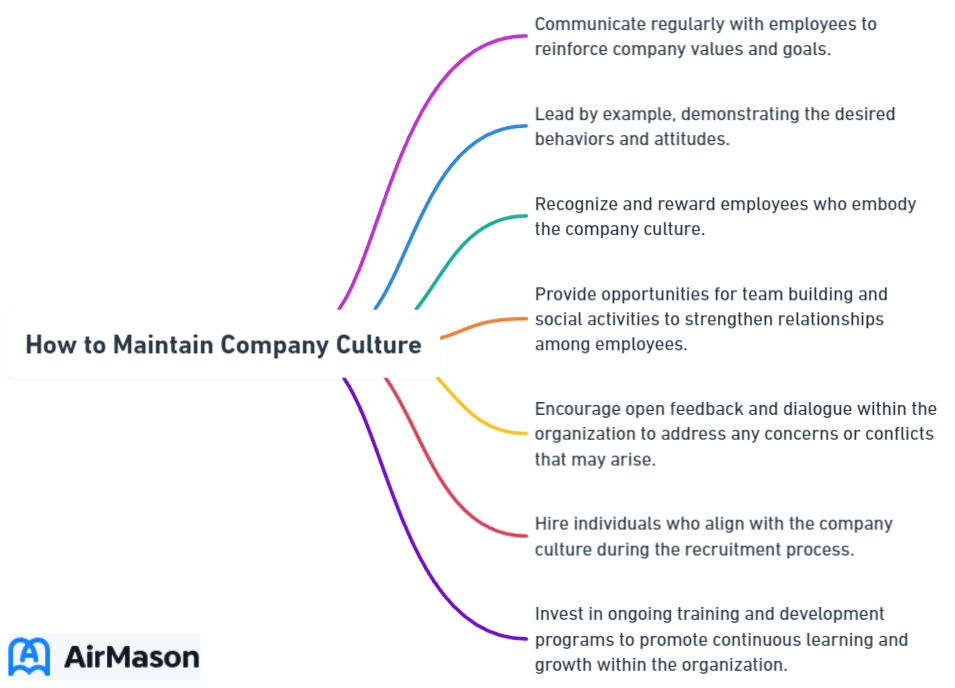
In today’s highly competitive business landscape, company culture has never been more crucial. As we navigate through 2024, a strong and positive company culture has become an essential ingredient to attract and retain top talent, foster employee engagement, and ultimately drive business success. But how can organizations maintain their unique culture as they grow and evolve over time? One key aspect to consider is learning how to maintain company culture effectively.
This comprehensive guide will delve into the importance of company culture, the process of building a strong foundation through defining and aligning company values, cultivating employee engagement and commitment, ensuring cultural fit during hiring and onboarding, adapting culture as the organization grows, leadership’s role in maintaining culture, measuring and evaluating culture, and ultimately, making necessary adjustments to improve it, all with a focus on how to maintain company culture throughout these processes.
Key Takeaways
- Company culture is essential for employee morale, engagement and business success.
- Leaders play an important role in establishing and upholding a company’s culture by setting good examples.
- Regular measurement of company culture utilizing techniques such as employee surveys is key to sustaining a positive work environment.
Understanding the Importance of Company Culture
A well-defined company culture can significantly impact employee morale, engagement, and overall business success. According to a survey conducted by Quantum Workplace, the most frequently used words to describe an ideal workplace culture are:
- “flexible”
- “inclusive”
- “friendly”
- “collaborative”
- “fun”
A positive company culture not only attracts the right candidates for open positions but also enhances productivity, reduces turnover, and increases employee engagement. However, maintaining a positive work culture as the business grows during rapid growth can be challenging.
Various factors shape a company’s culture, including the founders’ values and inclinations, industry requirements, and the company’s initial values, objectives, and assumptions. Adapting and preserving company culture is a vital step as the business expands to ensure ongoing success. Maintaining a robust company culture requires active involvement of employees in shaping and preserving it.
Building a Strong Foundation: Defining Your Company Values
Building a strong and positive company culture starts with defining the organization’s core values. These values serve as guiding principles for all individuals within the organization and set the foundation for the desired workplace culture. Involving leadership, long-term employees, and HR representatives in the process of determining a company’s core values ensures a comprehensive representation of the organization’s culture.
Setting clear definitions of company culture enables the organization to prioritize its values, beliefs, and attitudes, which fosters consistency in the culture as it evolves. Effectively communicating these values to new employees and organizational members helps them understand and embody the desired culture.

Aligning with Business Goals
Maintaining a robust organizational culture necessitates alignment of company values with the company’s mission and business goals. The company’s mission statement plays a vital role in this process, as it outlines the core purpose, values, and how the company intends to achieve its objectives.
If company values do not correspond to business objectives, it may lead to:
- disgruntled leaders and team members
- detrimental competition
- inadequate communication
- diminished productivity
- limited dedication
Businesses can establish a solid foundation for a positive workplace culture when company values align with the organization’s overall mission and vision. This alignment fosters a sense of unity and shared purpose among employees, ultimately contributing to the company’s success.
Communicating Values throughout the Organization
Communicating company values effectively aids employees in understanding and embodying the desired culture. More than half of survey respondents view employees at all levels as having an individual role in forming culture, with employees involved in this process. Leaders and managers are seen as the primary initiators for defining and communicating culture in the workplace. Employees recognise that these individuals play a major role in this process.
The onboarding of new employees is pivotal to the successful integration of new hires into the company culture. Sharing stories with new employees can help impart the corporate history, values, and priorities, forming a connection between the new employee and the organization. This not only ensures that employees feel welcomed but also fosters a sense of belonging and alignment with the company’s values.
An Organization’s Culture
An organization’s culture encompasses the shared values, beliefs, and norms that define its collective identity. It shapes how employees interact, make decisions, and approach their work. An organization’s culture is often considered its DNA, influencing everything from employee morale to productivity levels. It plays a pivotal role in attracting and retaining talent, as individuals are drawn to environments where they feel aligned with the prevailing ethos. Moreover, a healthy organizational culture fosters a sense of belonging and encourages teamwork, ultimately contributing to the overall success and longevity of the organization. When nurtured thoughtfully, an organization’s culture can serve as a powerful catalyst for innovation, adaptability, and sustained growth.
Cultivating Employee Engagement and Commitment

Fostering employee engagement and commitment hinges on creating an inclusive, respectful, and supportive work environment. A study conducted by SHRM revealed that empathy is a critical characteristic of a healthy workplace, and providing empathy training for people managers can lead to a more open and transparent communication culture, increased trust in supervisors, and a stronger sense of physical safety at work.
Team building activities can also help to enhance the collective strength of the team and further the development of a robust work culture. One way to do this is to recognize employee achievements, which can improve work culture and significantly influence individual and team morale, workplace engagement, and job satisfaction.
Ensuring Cultural Fit during Hiring and Onboarding

Maintaining a positive company culture involves carefully selecting candidates who align with company values and incorporating culture into the onboarding process. The “cultural add” recruiting model involves identifying candidates who possess and demonstrate your core values and provide a distinct viewpoint. Hiring for culture adds is essential for the growth and development of work culture and the addition of diversity to the office.
By selecting candidates who align with the desired company culture and effectively communicating these values during the onboarding process, organizations can ensure that new hires contribute positively to the existing culture and engage with the company’s values and expectations.
Hiring for Cultural Alignment
Recruiting with an eye for cultural alignment guarantees that new hires positively contribute to the existing company culture. Assessing whether a candidate’s values, beliefs, and behaviors align with the company’s culture helps to ensure that the new hire will adjust to the organization’s work environment and values, and integrate well into the existing team. The ASA framework’s selection component serves to preclude candidates who do not fit with the corporate culture from being hired.
Organizations such as Southwest Airlines take pride in recruiting personnel based on their personality and attitude rather than specific job-related skills. This approach helps to maintain a strong company culture while also attracting diverse talent.
Integrating Culture into Onboarding
Incorporating culture into the onboarding process enables new hires to comprehend and engage with the company’s values and expectations. Orientation programs can make new employees feel welcomed and provide information that may assist them in achieving success in their new roles. Companies like Ritz Carlton employ a systematic approach to employee orientation, considering it to be the key to retention.
Feedback seeking is essential for new employees during onboarding, as it assists them in determining any behaviors that need adjustment and obtaining a clearer understanding of whether their behavior aligns with the company culture and expectations. Implementing orientation programs or matching new employees with mentors can greatly facilitate onboarding.
Adapting Company Culture as Your Organization Grows

Adapting and maintaining the company culture becomes inevitable for continued success as organizations expand. This can be challenging, as new hires may not adhere to the company values and culture, and communication channels may become complex. To maintain a strong company culture, organizations should:
- Regularly assess the sentiment of employees regarding company culture through one-on-one meetings with department heads
- Conduct anonymous surveys to gather feedback on the company culture
- Include culture-related questions in exit interviews
By implementing these strategies, organizations can ensure that their company culture remains strong and aligned with their values.
Scaling culture initiatives and fostering collaboration along with cross-functional relationships enable organizations to preserve a robust and positive company culture, despite business growth and evolution.
Scaling Culture Initiatives
Scaling culture initiatives involves expanding and adapting the company’s culture as the organization increases in size and complexity. This ensures that the core values, beliefs, and behaviors that define the company’s culture are maintained and reinforced across all levels and departments. Some of the most efficacious practices for scaling company culture initiatives include:
- Recruiting self-directed personnel
- Involving personnel in conversations relating to culture
- Identifying corporate values
- Prioritizing leadership
Organizations such as:
- Patagonia
- Airbnb
- Zoom
- Intuit
have successfully scaled their culture initiatives, placing emphasis on values, creating a beneficial work atmosphere, and synchronizing their culture with their business objectives. Scaling culture initiatives helps safeguard corporate values, increase employee involvement and retention, and attract the best talent.
Encouraging Collaboration and Cross-Functional Relationships
Fostering collaboration and cross-functional relationships can create a sense of unity and teamwork within the organization. Collaboration and cross-functional relationships can enhance work efficiency by:
- Boosting engagement
- Strengthening relationships
- Increasing productivity and creativity
- Offering mentorship opportunities
- Promoting collaboration beyond typical work tasks
- Stimulating innovation
- Enhancing communication skills and organizational culture.
Promoting collaboration and inter-departmental relationships requires nurturing a culture of collaboration, facilitating team-building activities, and fostering open communication and cooperation among teams. These efforts not only contribute to a stronger organizational culture but also drive overall company success.
Company Atmosphere
The company atmosphere plays a pivotal role in shaping the overall work environment and employee experience. It encompasses the collective energy, culture, and values that permeate through the organization. A positive company atmosphere fosters collaboration, creativity, and a sense of belonging among team members. This environment encourages open communication and mutual respect, allowing employees to thrive and reach their full potential. Conversely, a negative or toxic company atmosphere can stifle productivity, lead to high turnover rates, and hinder the company’s overall success. Therefore, creating and maintaining a healthy and vibrant company atmosphere should be a top priority for any organization striving for long-term growth and employee satisfaction.
Leadership’s Role in Maintaining Company Culture

Leaders, through setting precedents, advocating transparency, and facilitating employee growth, significantly contribute to shaping and sustaining an organization’s culture. Employees regard the leader as a role model, and their behavior greatly influences the organization’s culture.
Some ways leaders can shape and sustain a positive culture include:
- Setting precedents for ethical behavior and professionalism
- Advocating for transparency and open communication
- Facilitating employee growth and development
By embodying these qualities, leaders can create a constructive work culture in which employees feel acknowledged and respected.
Leaders can also encourage employees and support their growth and development by recognizing their achievements and providing opportunities for professional development. By demonstrating leadership by example, leaders can ensure a strong and positive company culture that fosters employee engagement, satisfaction, and overall business success.
Measuring and Evaluating Company Culture

Regular measurement and evaluation of company culture is vital for sustaining a robust and positive work environment. Gathering employee feedback through surveys and adjusting culture initiatives according to the results obtained can help organizations identify areas of improvement and make necessary adjustments to their culture. Some of the most effective techniques for assessing company culture include:
- Employee surveys
- Third-party culture measurement tools
- Focus groups
- Exit surveys
Regular assessment and adjustment of culture initiatives, informed by employee feedback, can help organizations maintain a strong and relevant company culture during their evolution.
Employee Surveys and Feedback
Employee surveys and feedback provide valuable insights into the effectiveness of culture initiatives and areas for improvement. Best practices for conducting employee culture surveys include:
- Selecting the appropriate timing
- Utilizing best practices in survey design
- Encouraging high participation rates
- Defining clear objectives
Regularly conducting surveys can help track changes in employee culture and measure the effectiveness of initiatives, while providing employees with an opportunity to voice their opinions and concerns. Sharing the results and actions taken based on feedback not only ensures transparency but also fosters a sense of ownership and involvement in shaping the company culture.
Adjusting and Improving Culture Initiatives

As the organization evolves, adjusting and enhancing culture initiatives helps ensure that the company’s culture remains robust and relevant. Organizations can use employee feedback to identify areas of concern and devise targeted initiatives to address these issues. By ranking initiatives, executing interventions, and heeding employee opinions, companies can continuously improve their employee culture and make necessary adjustments.
Some strategies for improving company culture initiatives include fostering inclusiveness and diversity, creating a positive work environment, and focusing on the overall employee experience. By implementing these strategies, organizations can create a strong and positive company culture that supports employee engagement, satisfaction, and overall business success.
How to Build a Strong Company Culture
Building a strong company culture is essential for fostering a positive work environment and ensuring long-term success. To establish a robust culture within your organization, it’s crucial to start by defining your company’s values and mission. This serves as the foundation upon which all other aspects of your culture will be built. Encourage open communication channels to ensure that every team member understands and embraces these values. Additionally, lead by example and embody the cultural traits you wish to see in your employees. Recognize and celebrate achievements, both big and small, to reinforce the desired behaviors and attitudes. Finally, regularly seek feedback from your team to understand how the culture is perceived and where improvements can be made, creating a dynamic and adaptive work environment.
Summary
In conclusion, maintaining a strong and positive company culture in 2024 is essential for business success. From defining company values and aligning them with business goals to cultivating employee engagement and commitment, ensuring cultural fit during hiring and onboarding, adapting culture as the organization grows, and measuring and evaluating culture initiatives, organizations can create a thriving work environment that attracts and retains top talent.
By actively involving employees in shaping and preserving the culture, promoting transparency, fostering collaboration and cross-functional relationships, and continuously improving culture initiatives based on employee feedback, organizations can ensure a strong and vibrant company culture that supports their long-term success.
Frequently Asked Questions
How do companies maintain their culture?
Companies maintain their culture by recruiting the right people, establishing organizational policies and values, providing onboarding and training, and reinforcing core values through leadership and reward systems. Signifiers of a company’s culture include mission statements, stories, physical layout, rules and rituals.
What does it mean to maintain a company culture?
Maintaining a company culture means creating an environment that encapsulates how things get done and builds shared values and behaviors among employees. It ensures that employees have a consistent experience in the workplace, helping to create a more cohesive atmosphere.
What are the four methods for maintaining corporate culture?
Maintaining corporate culture involves recruiting, hiring, onboarding and training employees who fit the culture.
How can a company define its core values?
By consulting leadership, long-term employees, and HR representatives in the process of determining a company’s core values, organizations can ensure that their culture is accurately represented.
What is the importance of aligning company values with business goals?
Aligning company values with business goals is essential for fostering a unified and purpose-driven company culture, thereby encouraging employees to work together towards achieving shared objectives.